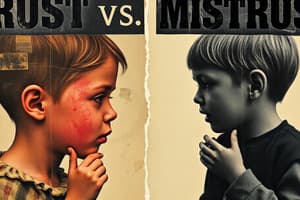Podcast
Questions and Answers
What behaviors are demonstrated from birth to 2 months?
What behaviors are demonstrated from birth to 2 months?
- Anticipates feedings
- Interested in surroundings
- Responds to no
- Demonstrates oral, narcissistic, & grasping behaviors (correct)
At what age do infants start to show interest in their surroundings?
At what age do infants start to show interest in their surroundings?
3 months
When do infants begin to anticipate feedings?
When do infants begin to anticipate feedings?
3 months
At what age can infants differentiate strangers from family?
At what age can infants differentiate strangers from family?
When do infants typically demonstrate stranger anxiety?
When do infants typically demonstrate stranger anxiety?
At what age do infants start to imitate simple acts and noises?
At what age do infants start to imitate simple acts and noises?
When do infants learn to respond to 'no'?
When do infants learn to respond to 'no'?
What is Erikson's first stage called?
What is Erikson's first stage called?
Infants learn to trust if they are cared for inconsistently.
Infants learn to trust if they are cared for inconsistently.
What is an important event related to the development of trust in infants?
What is an important event related to the development of trust in infants?
Flashcards are hidden until you start studying
Study Notes
Erikson's Psychosocial Stage: Trust vs. Mistrust
- Trust vs. Mistrust is the first stage in Erik Erikson's psychosocial development, occurring during the first year of life.
- Infants develop a sense of trust when caregivers provide consistent, adequate care, leading to feelings of safety and security.
- Inconsistent or emotionally unavailable caregivers can instill feelings of mistrust, resulting in a skepticism of the world.
Infant Behavioral Milestones
- Birth to 2 months: Infants exhibit oral, narcissistic, and grasping behaviors as part of their early development.
- 3 months: Infants show increased interest in their surroundings and begin to anticipate feeding times, indicating cognitive development.
- 5 months: Babies start to differentiate between strangers and familiar faces, demonstrating early social awareness.
- 6-13 months:
- Infants display stranger anxiety, which signifies a developing attachment to primary caregivers.
- They begin to imitate simple acts and noises, showcasing their learning and observational skills.
- Babies respond to the word "no," indicating growing comprehension and reaction to commands.
Key Developmental Event
- Feeding is a significant event during this stage, as it plays a crucial role in establishing trust and nurturing the infant's secure attachment to caregivers.
Studying That Suits You
Use AI to generate personalized quizzes and flashcards to suit your learning preferences.




